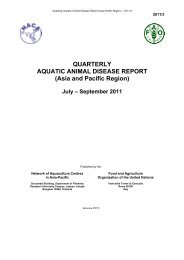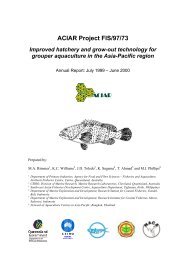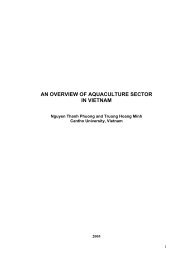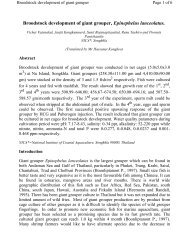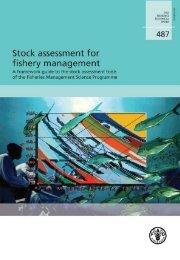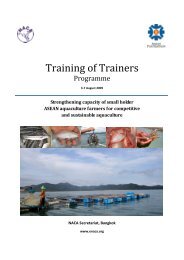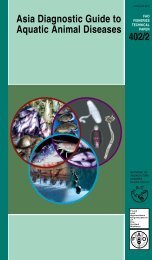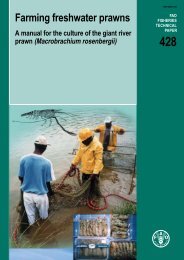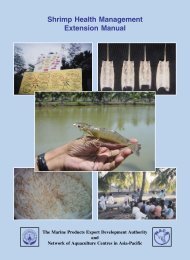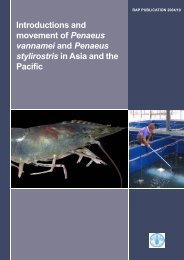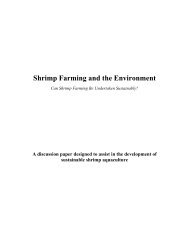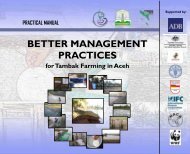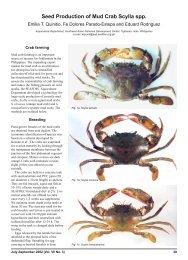State of World Fisheries and Aquaculture 2004 - Library
State of World Fisheries and Aquaculture 2004 - Library
State of World Fisheries and Aquaculture 2004 - Library
Create successful ePaper yourself
Turn your PDF publications into a flip-book with our unique Google optimized e-Paper software.
98<br />
The <strong>State</strong> <strong>of</strong> <strong>World</strong> <strong>Fisheries</strong> <strong>and</strong> <strong>Aquaculture</strong> <strong>2004</strong><br />
Box 9<br />
Governance <strong>and</strong> fisheries in the high seas<br />
The freedom to fish on the high seas, where most deep-sea fisheries<br />
occur, can be traced back to the work <strong>of</strong> Grotius in the seventeenth<br />
century, but its roots can be traced back even earlier – to the time <strong>of</strong><br />
Roman law. Its continued acceptance in the ensuing centuries resulted<br />
in its incorporation into customary international law <strong>and</strong> subsequently<br />
into its codification during the second half <strong>of</strong> the twentieth century.<br />
Thus, the United Nations Convention on the Law <strong>of</strong> the Sea, which<br />
entered into force in 1994, 12 years after its adoption <strong>and</strong> opening to<br />
signature in 1982 <strong>and</strong> providing the cornerstone <strong>of</strong> the current high<br />
seas legal regime, strongly reaffirms in its Article 87 the principle <strong>of</strong><br />
“freedom <strong>of</strong> the high seas”. Among the freedoms listed in that article<br />
is the “freedom <strong>of</strong> fishing”. It must be stressed that this freedom is not<br />
unlimited or unqualified; rather, it is “subject to the conditions laid<br />
down in the articles under Section 2 [<strong>of</strong> Part VII]”, which establish a<br />
number <strong>of</strong> obligations that states fishing on the high seas must respect.<br />
Additionally, as noted in Article 87 (2), all “these freedoms shall be<br />
exercised by all <strong>State</strong>s with due regard for the interests <strong>of</strong> other <strong>State</strong>s<br />
in their exercise <strong>of</strong> the freedom <strong>of</strong> the high seas”. 1<br />
It is important to stress that these provisions apply to all countries<br />
– to the Parties to the Convention, <strong>and</strong> also to non-Parties in respect <strong>of</strong><br />
its requirements that reflect the existing customary international law.<br />
Thus, the rights <strong>of</strong> states fishing on the high seas are qualified by: (a)<br />
their treaty obligations (Art. 116 [a]); (b) their duty to adopt measures<br />
for the conservation <strong>of</strong> living resources (Art. 117); (c) their duty to<br />
cooperate with other states in the conservation <strong>and</strong> management <strong>of</strong><br />
living resources in the areas <strong>of</strong> the high seas (Art. 118); <strong>and</strong> (d) their<br />
duty to take measures to maintain or restore populations <strong>of</strong> harvested<br />
species [to] produce the maximum sustainable yield (Art. 119 [a]).<br />
It could be expected that these provisions <strong>of</strong> the Convention would<br />
provide a framework sufficiently comprehensive <strong>and</strong> strict to allow<br />
for an efficient management <strong>of</strong> the fishery resources <strong>of</strong> the high seas,<br />
where many deep-sea fisheries occur, <strong>and</strong> in particular to avoid the<br />
problems that might arise from an unqualified regime <strong>of</strong> freedom.<br />
However, in practice, the establishment <strong>of</strong> this set <strong>of</strong> obligations has not<br />
been followed by their development <strong>and</strong> implementation, <strong>and</strong> freedom<br />
to fish on the high seas combined in most cases with a de facto open<br />
access to fishery resources has resulted in a serious <strong>and</strong> problematic<br />
situation, characterized most notably by the lack <strong>of</strong> incentives for<br />
individuals to constrain fishing effort <strong>and</strong> comply with conservation<br />
measures.<br />
One <strong>of</strong> the persisting problems is how to achieve, through<br />
RMFOs, the adoption <strong>and</strong> effective enforcement <strong>of</strong> conservation<br />
<strong>and</strong> management measures, especially catch quotas. Additionally,<br />
conservation <strong>and</strong> management issues are <strong>of</strong>ten overshadowed by those<br />
related to maximizing benefits from high seas fisheries resources <strong>and</strong><br />
solving the allocation problems that are commonly experienced in<br />
fisheries management arrangements. Countries that already belong<br />
to an RFMO might argue that the resource is effectively managed



